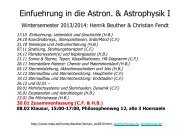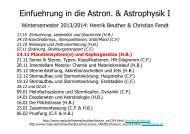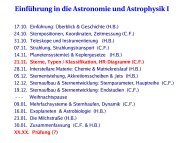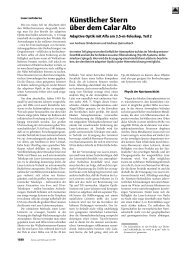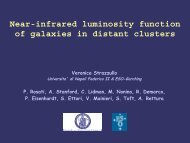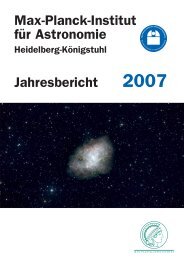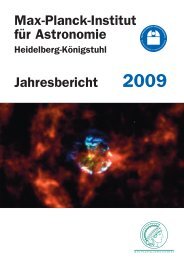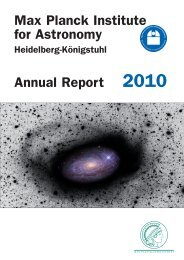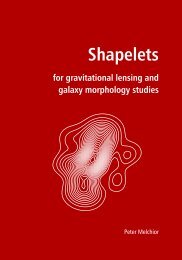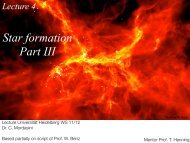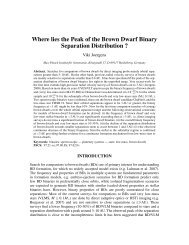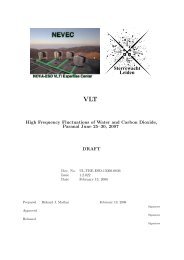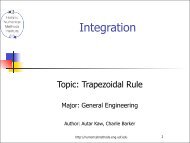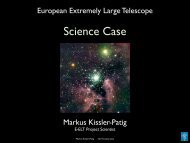Annual Report 2011 Max Planck Institute for Astronomy
Annual Report 2011 Max Planck Institute for Astronomy
Annual Report 2011 Max Planck Institute for Astronomy
Create successful ePaper yourself
Turn your PDF publications into a flip-book with our unique Google optimized e-Paper software.
86 V. People and Events<br />
Credit: D. Gouliermis<br />
V.2 Haus der Astronomie – Centre <strong>for</strong> <strong>Astronomy</strong> Education and Outreach<br />
<strong>2011</strong> was a crucial year <strong>for</strong> the Haus der Astronomie<br />
(HdA). Where we had spent the last two years establishing<br />
the HdA as an institution, this December saw the<br />
official opening of our spectacular, galaxy-shaped building.<br />
Thus, our mission this year was to hit the ground<br />
running: As soon as possible after the opening, we wanted<br />
to make the best use possible of the building and<br />
the new opportunity it represented. That meant having<br />
almost all of the center’s planned outreach activities already<br />
in place by the end of the year.<br />
We started into <strong>2011</strong> with an experienced team: Markus<br />
Pössel as the HdA’s Managing Scientist (funded by<br />
<strong>Max</strong> <strong>Planck</strong> Society) had been with the center since<br />
2009. Olaf Fischer (funded by the City of Heidelberg’s<br />
Foundation <strong>for</strong> Youth and Science), our resident specialist<br />
<strong>for</strong> high-school astronomy, had moved to the<br />
HdA in late 2009. Carolin Liefke (funded by the Klaus<br />
Tschira Foundation and Baden-Württemberg’s Ministry<br />
of Science and Research), whose focus areas include<br />
student research and university teaching <strong>for</strong> future<br />
physics teachers, has been with us since spring<br />
2010. Cecilia Scorza, who specializes in middle school<br />
astronomy education, joined us in 2009; since early<br />
<strong>2011</strong>, she works at HdA as a project scientist funded by<br />
the Special Research Programme SFB 881 “The Milky<br />
Way System”. Jakob Staude, one of the driving <strong>for</strong>ces<br />
behind the HdA project as a whole, remains our mentor-in-residence.<br />
In May, we were joined by Natalie<br />
Fischer, who became the National Project Manager <strong>for</strong><br />
the EU-UNAWE project, which aims to bring astronomy<br />
to young, disadvantaged children; also <strong>for</strong> EU-UN-<br />
AWE, the developmental psychologist, Anita Mancino,<br />
joined our team in September. Also in September, two<br />
teachers (Gymnasium and Realschule), on loan from<br />
Baden-Württemberg’s Ministry of Education, joined<br />
our team: Alexander Ludwig and Tobias Schultz will<br />
spend 50% of their time in the HdA, where, among<br />
other tasks, they will be involved in holding highschool<br />
student workshops. Intern Marcel Frommelt<br />
and student assistants Stephan Fraß and Sophia Haude<br />
completed our roster.<br />
Our threefold mission is unchanged: To communicate<br />
the fascination of astronomy to the general public,<br />
to support astronomy education, and to foster the exchange<br />
of knowledge between scientists.<br />
Fig. V.2.1: The Haus der <strong>Astronomy</strong> at dusk (30 November<br />
<strong>2011</strong>).



